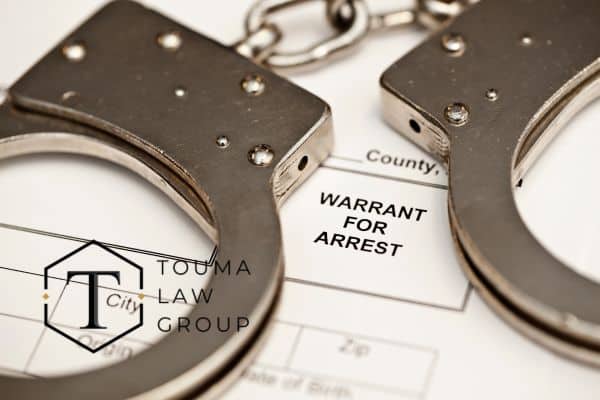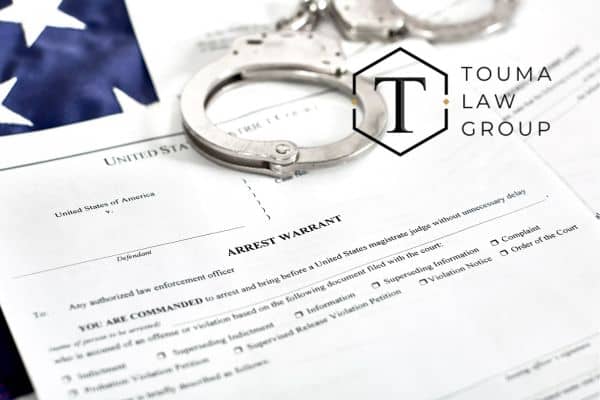Learning that there might be a warrant of arrest issued in your name can be frightening. Whether it’s due to a missed court date, unpaid traffic tickets, or probation violations, knowing what to do if there is a warrant out for your arrest can help you avoid unnecessary jail time and protect your rights.
At Touma Law Group, our criminal defense attorneys help clients throughout South Carolina resolve arrest warrants and take immediate action to protect their freedom.
Understanding Arrest Warrants
An arrest warrant is a legal order signed by a judge that authorizes law enforcement officers to take a person into custody. It’s often based on probable cause, meaning there’s a reasonable belief that the person committed a crime.
Judges issue different kinds of warrants, including:
- Bench warrants – typically issued when someone fails to appear in court or violates a court order.
- Probable cause warrants – issued when police provide sworn statements or affidavits showing evidence of a crime.
- Civil warrants – sometimes used in non-criminal matters, such as failure to comply with a court judgment.
Even minor offenses, like unpaid traffic tickets or missed driving safety course completions, can result in an active warrant.

How to Know If You Have a Warrant
There isn’t a single online database that shows every active warrant in South Carolina, but there are reliable ways to check.
1. Contact the Clerk of Courts or Sheriff’s Office
Your county’s Clerk of Courts or sheriff’s office can confirm if a warrant of arrest has been issued. Many counties now offer an online Warrant Search through their websites.
2. Search Court System Records
You can visit your local courthouse or use the court’s online services to search case information or confirm upcoming court dates. If you missed a court hearing, a judge may have issued a bench warrant for failure to appear.
3. Speak with a Criminal Defense Lawyer
Hiring an experienced criminal defense lawyer is the safest way to confirm a warrant and understand your next steps. Attorneys can access official court documentation, contact the deputy clerk, and negotiate on your behalf to reduce potential penalties.
Why a Warrant Might Exist
You might have an active warrant for several reasons:
- Failure to appear for a court hearing or arraignment hearing
- Probation violations or missed probation revocation hearings
- Failure to pay fines or cash bonds
- Driving with a suspended license or other license suspension issues
- Violating the terms of a First Conviction Program or skipping a MADD class or AA meetings
Sometimes, even a misunderstanding in the court system or court documentation can trigger a regular warrant.

What to Do If There Is a Warrant Out for Your Arrest
If you discover you have an active warrant, do not ignore it. Warrants don’t expire, and the longer you wait, the more serious the situation becomes.
1. Contact a Criminal Defense Attorney Immediately
Call a qualified criminal defense attorney as soon as possible. A private attorney can communicate with the court, verify the details of the warrant, and arrange a controlled surrender. In some cases, your lawyer can appear on your behalf or schedule a court hearing before you are booked.
If you cannot afford a lawyer, you may be assigned a public defender, but working with your own criminal defense lawyer gives you more control and personal attention during the criminal case.
2. Do Not Speak to Police Without Representation
You have the constitutional right to remain silent. Anything you say to a police officer or peace officer can be used against you later. Politely tell law enforcement that you wish to speak to your lawyer first.
3. Voluntarily Surrender Under Legal Guidance
Your attorney can contact the sheriff’s office or law enforcement to coordinate your surrender. Doing this voluntarily shows responsibility and may improve your chances of securing a favorable outcome during your arraignment hearing.
4. Understand the Booking Process
Once in custody, you’ll go through the booking process, which includes fingerprinting, photographing, and entering your information into the court system. After booking, you’ll have the opportunity to post bail.
5. Work with a Bail Bondsman
If bail is set, a bail bondsman or bail bondsperson can help you post bond, typically about 10% of the total amount. In some cases, surety bonds or cash bonds are accepted. Your attorney can connect you with reputable local professionals to help you secure release quickly.
Can a Warrant Be Resolved Without Jail Time?
Yes, in many cases. Your criminal defense lawyer can negotiate with prosecutors or the clerk of courts to recall the warrant and schedule a new court date without you being taken into custody.
Depending on the nature of your criminal case, the court may allow you to:
- Pay overdue fines or fees
- Attend missed programs like AA meetings or a driving safety course
- Provide proof of correction (for example, showing you renewed your driver’s license)
- Complete court-ordered conditions like counseling or community service
Acting quickly and with legal help demonstrates cooperation, which courts tend to reward.

Validity of an Arrest Warrant
Every warrant of arrest must meet specific legal standards to be valid. It must include:
- Your name and identifying information
- The offense or charges alleged
- The judge’s signature and issuing court documentation
- Details showing probable cause for your arrest
If any element is missing or incorrect, your attorney can challenge the warrant’s validity. A violation of your constitutional rights could lead to evidence being thrown out or your case being dismissed entirely.
What Happens After You Turn Yourself In
Once you appear before a judge, you’ll likely have an arraignment hearing, where you’ll be formally informed of the charges. This is when your lawyer can request release on bail or negotiate conditions to keep you out of jail.
Depending on your record, your attorney may also recommend alternatives like a First Conviction Program or community service instead of incarceration.
If your case involves a juvenile hearing or grand jury review, the process may differ slightly, but your lawyer will guide you through every step.
Learn More: Greenville Juvenile Crime Defense Lawyer
Common Misunderstandings About Warrants
- Bench Warrants vs. Arrest Warrants: A bench warrant is typically for procedural issues, while an arrest warrant often follows a criminal complaint or criminal investigation.
- Search Warrant: A search warrant allows police to search property for evidence; it’s separate from an arrest warrant.
- Pick-Up Orders or Direct Capias: These are court orders requiring immediate detention, often issued in more serious or repeat cases.
Understanding these distinctions helps you and your attorney determine the best strategy to resolve your case.
Why You Need Legal Help
Navigating an active warrant without legal experience can make things worse. A knowledgeable criminal defense attorney knows how to:
- Communicate with the sheriff’s office and law enforcement
- Review court documentation and procedural errors
- Negotiate bail or surety bonds
- Protect your constitutional rights during questioning and arrest
Some defendants rely on online searches or outdated information, but only an attorney can give you accurate advice based on current laws and your unique situation.
Take Action Before It’s Too Late
Ignoring an active warrant won’t make it disappear; it only increases the risk of being arrested at home, work, or during a routine traffic stop. Taking proactive steps with the help of a criminal defense lawyer can prevent embarrassment, jail time, and damage to your reputation.
If you believe you might have a warrant of arrest, call Touma Law Group immediately. Our team will conduct a warrant search, contact the court system, and help you move forward confidently.
Contact Touma Law Group Today
Dealing with an arrest warrant is stressful, but you don’t have to face it alone. The team at Touma Law Group has extensive legal knowledge and experience helping clients throughout South Carolina resolve criminal cases and protect their freedom.
Our attorneys will guide you through every step from the booking process to the arraignment hearing and work tirelessly to minimize the impact on your life.
Call Touma Law Group today at (864) 618-2323 for a Free Consultation and personalized guidance on how to handle your situation. Take control of your case before law enforcement does.
Frequently Asked Questions About Arrest Warrants in South Carolina
When you learn of an arrest warrant issued in your name, you likely have many questions. Below are answers to common concerns regarding active warrants or Bench Warrants in South Carolina. Knowing your rights and options can help you manage the situation proactively.
Can I find out if I have an arrest warrant online?
Some South Carolina counties allow residents to perform a warrant search through the Sheriff’s Office or Clerk of Courts websites. However, not every county has an online database. The most reliable way to find out is to contact a criminal defense attorney who can confirm if there’s a warrant of arrest issued in your name.
What should I do if there is a warrant out for my arrest?
If you learn there’s an active warrant, the most important step is to call a criminal defense lawyer immediately. Your attorney can contact the court system, verify the warrant, and schedule a court hearing or voluntary surrender, often avoiding a sudden arrest by law enforcement.
Can police arrest me without a warrant?
Yes, but only under specific circumstances. Police officers and peace officers can make a warrantless arrest if they personally witness a crime or have probable cause to believe a serious offense occurred. Even in those situations, you have the right to remain silent and request a lawyer before answering any questions.



